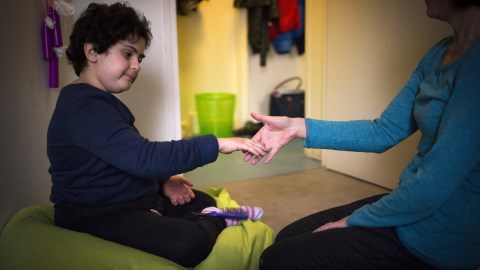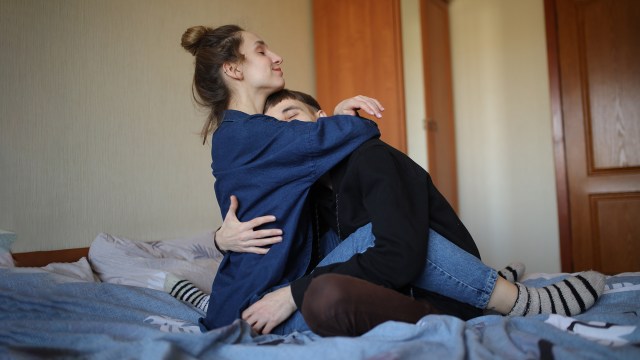‘I hope he doesn’t feel too lonely’ — COVID-19 hits people with intellectual disabilities hard

MARTIN BUREAU/AFP via Getty Images
My brother was supposed to move into his first “independent” home in mid-March. In his late 20s, and a person with an intellectual disability, he had finally gathered up the courage and the will to move out of our family home and live in a group home.
Because of the coronavirus pandemic, my brother’s move is now delayed indefinitely, and his world remains mostly his bedroom. He can’t go to his part-time job, the library, or to church.
My brother and many others with intellectual disabilities face the additional burden of increased loneliness during COVID-19. While many people are experiencing isolation, anxiety and loneliness during this challenging time, we know that prior to COVID-19, 45% of people with intellectual disabilities reported feeling lonely (that’s compared to only 10.5% of the general population). The increased pressures living in quarantine can result in challenges to mental health, sleep disruptions and mood swings.
We know that loneliness is correlated with serious health risks such as heart disease, weakened immune systems and stroke. For people with intellectual disabilities who had already long experienced loneliness and social ostracization, what significant impacts might this have on their mental and physical health? Many COVID-19 patients die alone. For people with intellectual disabilities already experiencing severe loneliness, this fact seems particularly cruel.
People with intellectual disabilities often utilize resources such as home health aides, day programmes, drop-in centres, family respite services and group homes. For health and safety reasons, many of these services are now unavailable or closed, increasing the responsibility of family members, affecting the routine of people with intellectual disabilities and significantly impacting their independence. My brother is not able to go to his state-funded part-time job, removing his interaction with others outside of our immediate family and taking away the sense of purpose he felt by doing work.
These COVID-19-related service changes also reveal the complex interdependencies with families, caregivers and staff that most people with intellectual disabilities depend on in their day-to-day lives. In China, a family made headlines when a teenager with cerebral palsy died in Wuhan after his father and brother, diagnosed with coronavirus, were quarantined in a treatment facility and unable to care for him.
Some people with intellectual disabilities are not able to quarantine alone or stay with their families due to their enhanced medical or behavioural needs. Remaining in group homes or similar long-term care facilities can allow people with intellectual disabilities access to the care they need, but may put them at a much greater risk of infection. For people with intellectual disabilities who live independently or semi-independently but rely on home health aides, they and their families weigh the risk of exposing themselves to infection or not receiving the daily life supports they need.
In addition to all of the health and safety guidelines we all must decipher and follow, people with intellectual disabilities face increased challenges when it comes to staying safe during COVID-19. My brother and many like him have had their daily routine disrupted completely, a challenge for many people with intellectual disabilities. Understanding the rapidly changing information about COVID-19 or updates to public health guidance can be puzzling, and people with intellectual disabilities may struggle to communicate without non-verbal cues.
In Saskatoon, Canada, some people with intellectual disabilities were so confused about the public health guidance to social distance that they went without groceries or other necessities. It is unlikely that my brother really understands the importance of washing his hands or remembers how to do so correctly, even after seeing a video or reading a detailed pamphlet.
Organizations that support and advocate on behalf of people with intellectual disabilities are working hard to continue to provide services and resources, even amid reduced revenue and logistical challenges. Inclusion Europe has produced an easy-to-read instructional guide about coronavirus, designed for people with intellectual disabilities, available in several languages. The UN has produced resources about how to include marginalized and vulnerable people, including those with intellectual disabilities, in risk communication and community engagement. The International Disability Alliance has issued specific recommendations for a disability-inclusive COVID-19 response.
People with intellectual disabilities face the prospect of navigating a healthcare system that is rationing care. During a time of resource scarcity, like the one many countries are experiencing during COVID-19, there simply aren’t enough resources for every patient that needs them. When this occurs, medical professionals need to decide which patients receive these resources, thus rationing out the care that is available.
In Italy, there are many stories of hospitals too overwhelmed with patients to ventilate every person who needs it – medical professionals are forced to make heartbreaking choices about who receives care.
In the United States, the disability community, including the American Association of People With Disabilities, has advocated strongly against guidance in disaster preparedness plans such as those released by states like Washington, Kansas, Tennessee and Alabama that recommend end-of-life decisions that could disadvantage people with disabilities, including some that do not recommend providing ventilators to those with “severe mental retardation”. Disability advocates assert that these policies directly impact civil rights. In response, the director of the federal health department’s civil rights office has begun investigations, and some of these states, including Washington and Kansas, are in the process of updating their guidelines to ensure they do not implicitly or explicitly condone discrimination.
Still, the fear and uncertainty associated with rationing of care is deeply disturbing to people with intellectual disabilities, who are worried that medical professionals, forced to make quick decisions and without a full understanding of their capacity and medical history, might prevent them from receiving medical resources.
People with disabilities and their advocates rightly point out that doctors may make assumptions about people with disabilities based on bias. These fears are supported by research that ableism in medicine does exist. People with intellectual disabilities and their family members remember unethical medical research done on people with intellectual disabilities in the name of science, like those experiments done on unwilling participants at Willowbrook State School in New York. People with intellectual disabilities are still subject to forced sterilization around the world.
For now, I am grateful that my brother doesn’t seem to understand all the fuss around COVID-19 and I’m relieved that he’s stuck at home. I hope that he doesn’t feel too lonely. When I think of the inevitable time when we are allowed to return to our community, I wonder if my brother will follow hygiene guidelines. Will he stay away from people who are coughing? Will he tell us if he has a fever? For now, if he has to go to the hospital, I have to hope that his life is considered as valuable as someone without a disability.
Reprinted with permission of the World Economic Forum. Read the original article.





